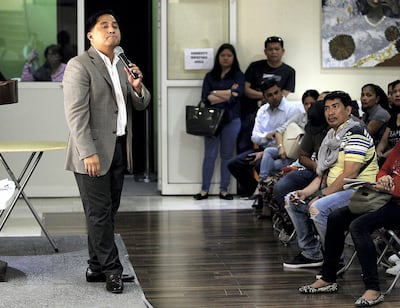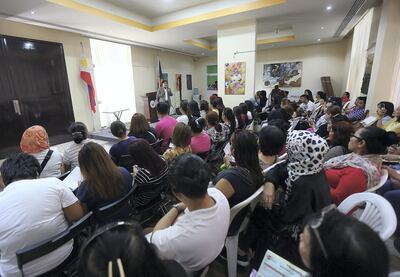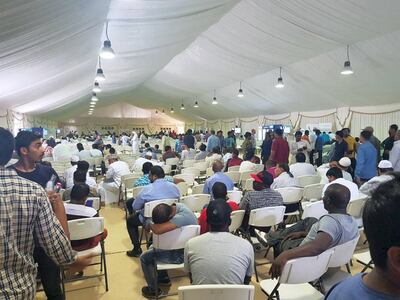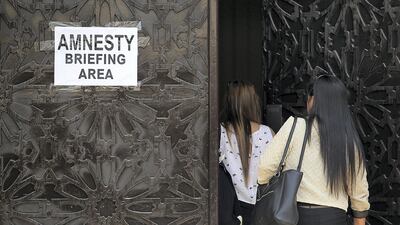Embassy staff say they have been taken aback by the number of people applying for help under the Government’s visa amnesty scheme.
Officials are seeing thousands with expired documents, causing queues outside consulates.
Philippine consul general Paul Cortes on Sunday said his officers were dealing with hundreds of cases of people who had lost their passports.
Other common problems include employers failing to process visas correctly and mothers who gave birth to children in the UAE but had not registered them.
Many residents who have overstayed their visas have turned to their country’s embassies before travelling to special immigration centres in Al Aweer in Dubai and Shahama in Abu Dhabi, among others.
“We have had a lot of enquiries, maybe 1,000 a day. It’s a lot more than we were anticipating,” Mr Cortes said. “I’m not sure we should be proud that this number of people are seeking a visa amnesty.
“It raises a lot of questions over visa policy, as people are coming over on a tourist visa and then seeking employment. We’ve had a lot of enquiries from people asking for help.”
The latest visa amnesty offered by the UAE runs for three months until October 31 this year. Under the programme, immigration offices in each of the seven emirates are open from 8am until 8pm.

Consular staff from India, Pakistan, Kenya, Ethiopia, Indonesia and Sri Lanka have also set up temporary desks in the immigration centres to help expatriates navigate the process of obtaining an exit pass for the UAE.
All applicants must show a valid air ticket to obtain a pass, and then leave the country within 10 days of it being issued.
Mohammed Ismail, 26, from Pakistan, said he arrived in the UAE on a tourist visa four months ago and then began looking for work. But after getting involved in a fight he was arrested and his passport was confiscated by police.
“I was told to pay a Dh15,000 fine but I couldn’t afford it so I went to prison for 15 days instead,” he said. “I was told to report to Naif police station and hand in my passport. I can’t get it back and return to Pakistan until I have an exit stamp. That’s why I’m applying for amnesty.”
Since the programme began last week, high numbers of Filipino workers have sought assistance. Queues of people snaked around the Philippine consulate in Al Qusais and into the desert yesterday.
Official figures show the number of Filipinos living in the UAE in 2016 was about 680,000. But that number is believed to have grown to 750,000.

For those now wishing to return home, the Philippine government has agreed to cover the cost of an exit pass and the fee for those needing to have charges for absconding dismissed.
The government is also covering the cost of a one-way flight ticket home for those choosing to leave, but will not pay the fees of anyone wishing to stay.
“Most people we are seeing don’t have their passports,” Mr Cortes said. “They’ve given them to their employer or agency that hired them.
“Some have just lost their passports altogether, others have cases where their employers have failed to process their visa and it has dragged on for months accumulating big fines.
________________
Read more:
UAE visa amnesty proves a lifeline for homesick family
340,000 reasons to show compassion in visa amnesty
_________________
“We have seen mothers who have overstayed, lost their jobs and given birth. They don’t have visas for themselves or their children and the kids have no passport, with no insurance or education.
“It is the best option for them to go home, as long as the parents do not have police cases against them.”
Mr Cortes said people with ongoing criminal cases against them of any kind, either for morality, alcohol or financial penalties, should first visit a police station before applying for an amnesty.
“That can be a lengthy process,” he said.
“It may involve a travel ban, and it is likely people will still not be able to leave until they have paid off their debts.”

The amnesty is only applicable to those overstaying visas and in absconding cases.
Filipino Ralph, 26, said he had accumulated Dh42,000 in fines for overstaying his visa. He said he moved to Dubai four years ago where he first worked as a tailor before getting a job at a supermarket in Jumeirah Lakes Towers.
“I had a sponsor but my employer did not paste the visa into my passport,” Ralph said. “I later found out it was only valid for a month.
“I’ve now been living without a visa for two years and I was worried what would happen. It was not my fault, and my company said they would sort it out but it never happened.”
Ralph filed a case against his company with Dubai Police, but as he was only earning Dh2,200 a month he felt trapped until he heard of the amnesty.
“I couldn’t leave and the fine kept growing,” he said. “When my friend told me about the amnesty it was a big relief. I was afraid to come here at first, I thought they would put me in jail.
“After a few days and speaking with other people I realised I would be OK. I’m surprised just how many people are here.”


